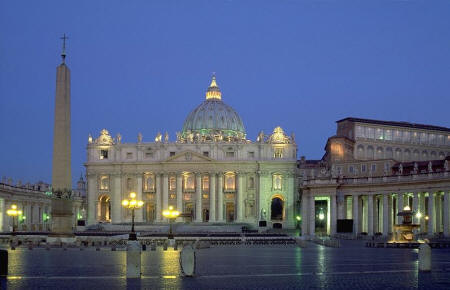Francis is making it easier for ambitious
people to value simplicity
The hardest task for a top leader,
religious or otherwise, is to pass up any of the swag bags and
perks of high office.
Enter Francis, who
declined to live in the
luxurious papal suite in order to remain in the relatively
humbler Vatican guesthouse, and who chooses simple garments over
ornate ones.
Francis might have seemed a bit
naïve or quaint if he’d poped a generation or two ago, back when
society worried less about environmental limits or
sustainability. But millennials today are gripped by doubts
about whether they can live at the posh levels of past
generations, as well as suspicions that the ways of the past
aren’t sustainable.
This pope will inspire them to make
an impact that goes beyond having nice possessions.
Francis is changing how we distinguish
between "important people" and "unimportant" ones
While a Billy Graham seemed
to take special pride in counseling presidents within the
splendid halls of power, Francis has made a career of quietly
heading out to slums in order to care for marginalized people.
And, strikingly, he asks those
people to pray for him, which is a subtle but powerful
reminder that the people at society’s margins too have something
meaningful to give.
Francis is reintroducing a healthy tension
between the concept of virtue and the practice of capitalism
Just google up "Francis and
antichrist," and you’ll get some fascinating "proofs" that the
pope has 666 tattooed somewhere on his body. In fact,
Francis is more the anti-Ayn Rand, the polar opposite of that
uber-capitalist who blamed the poor for their own misfortune.
I
wrote a few days ago about the
conundrum that arises when Christian belief come into contact
with aggressive capitalism. Francis goes so far as to say that
excessive admiration for capitalism can be a kind of idolatry, a
worshipping of the golden calf.
Granted, Francis’ pronouncements on
capitalism may be imperfect or incomplete or misguided in the
minds of some.
Still, he is the first global
religious leader in maybe centuries to bring up the elephant in
the room, which is the tension between the
Ayn Rand school of economics
and the great world religions such as Christianity.
Francis is drawing a dividing line between
high status and good character
The photos of Francis clasping,
kissing and blessing a disfigured man caused a
global stir this past November.
We’ve seen many people be pope or
priest or politician - but we’ve seen few use their power in a
more humanizing manner.
"Character is destiny,"
Heraclitus said.
And in that moment, Francis
exemplified a manner of character that most of us admire but
which few of us could match.
Such displays of character make
critics treat him with far greater respect than they otherwise
would. And it is such displays of character that will remind
Catholics, non-Catholics, agnostics and atheists alike that
power and position aren’t ends in themselves.
Rather, power and position are means
for displaying virtue and character.
Francis is building a path for civil
discussion of our worst hot-button issues
For the moment, at least, it’s good
to be pope. Francis has managed to make himself the darling of
some progressives.
Still, expect the honeymoon to end
soon enough, and for Francis to come increasingly
under fire by progressives as
they realize he will not go as far as they would hope on issues
such as gender and sex.
Meanwhile, Francis has already been
pilloried by Rush Limbaugh
and others on the right for being a Marxist in shepherd’s robing.
Our times are ridiculously
contentious. Conservatives bristle at how Francis states the
Occupy movement’s case with greater eloquence than that movement
itself could muster.
And many progressives grouse about
how the Catholic church is
the same old church despite its
new tone.
Still, Francis should manage to
unite liberals and conservatives in some meaningful way. Both
may come to understand that Francis is motivated by loftier and
more complex values than black-and-white partisanship.
In that case, a more civil tone
would finally be possible in our hopelessly gridlocked
democratic societies.
And that may well become Francis’
greatest contribution of all.

